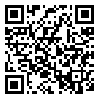Volume 27, Issue 2 (7-2021)
Back to this Issue |
Back to browse issues page
Download citation:
BibTeX | RIS | EndNote | Medlars | ProCite | Reference Manager | RefWorks
Send citation to:



BibTeX | RIS | EndNote | Medlars | ProCite | Reference Manager | RefWorks
Send citation to:
Mousavi S K, Kamali M, Azizkhani H. Effect of telephone education on medication adherence in patients with epilepsy. Journal of Hayat 2021; 27 (2) :117-129
URL: http://hayat.tums.ac.ir/article-1-4060-en.html
URL: http://hayat.tums.ac.ir/article-1-4060-en.html
1- Dept. of Medical Surgical Nursing, Abhar School of Nursing, Zanjan University of Medical Sciences, Zanjan, Iran , kazemmoosavi69@gmail.com
2- Dept. of Medical Surgical Nursing, Abhar School of Nursing, Zanjan University of Medical Sciences, Zanjan, Iran
3- Valiasr Hospital, Zanjan, Iran
2- Dept. of Medical Surgical Nursing, Abhar School of Nursing, Zanjan University of Medical Sciences, Zanjan, Iran
3- Valiasr Hospital, Zanjan, Iran
Abstract: (2810 Views)
Background & Aim: Epilepsy is the most common chronic neurological disease after headache. About half of the patients with epilepsy do not properly adhere to medication regimens, which leads to a lack of control over seizures, increased treatment costs, and even increased mortality rate in these patients. The aim of this study was to determine the effect of telephone education on medication adherence in patients with epilepsy.
Methods & Materials: In this quasi-experimental study, 60 patients referred to neurology clinic of Valiasr Hospital in Zanjan in 2019 were selected by the convenience sampling method, and were randomly divided into either control or experimental groups. The Morisky drug adherence Questionnaire was used for data collection. At the beginning of the study and after completing the questionnaires, a face-to-face training session was held for the study participants. Then, telephone education was performed for the experimental group for two months and no intervention for the control group. Two months after the intervention, all the patients completed the questionnaire again. Finally, the collected data were analyzed through the SPSS software version 25 using descriptive (mean and standard deviation) and inferential statistics (Chi-square, Fisher's exact test, independent t-test and paired t-test).
Results: Before the intervention, there was no statistically significant difference between the two groups in terms of individual characteristics and medication adherence scores (P<0.05); But two months after the intervention, a statistically significant difference was observed in the mean score of medication adherence between the two control and experimental groups so that the patients in the experimental group had higher scores of medication adherence (P<0.001).
Conclusion: The results of this study showed the usefulness of using the telephone education method in improving the medication adherence of patients with epilepsy. Therefore, it is recommended that this method be used in the training program for these patients. In addition, further studies are needed on the comparison of the effectiveness of telephone education with other methods of telemedicine such as cyberspace and online education.
Methods & Materials: In this quasi-experimental study, 60 patients referred to neurology clinic of Valiasr Hospital in Zanjan in 2019 were selected by the convenience sampling method, and were randomly divided into either control or experimental groups. The Morisky drug adherence Questionnaire was used for data collection. At the beginning of the study and after completing the questionnaires, a face-to-face training session was held for the study participants. Then, telephone education was performed for the experimental group for two months and no intervention for the control group. Two months after the intervention, all the patients completed the questionnaire again. Finally, the collected data were analyzed through the SPSS software version 25 using descriptive (mean and standard deviation) and inferential statistics (Chi-square, Fisher's exact test, independent t-test and paired t-test).
Results: Before the intervention, there was no statistically significant difference between the two groups in terms of individual characteristics and medication adherence scores (P<0.05); But two months after the intervention, a statistically significant difference was observed in the mean score of medication adherence between the two control and experimental groups so that the patients in the experimental group had higher scores of medication adherence (P<0.001).
Conclusion: The results of this study showed the usefulness of using the telephone education method in improving the medication adherence of patients with epilepsy. Therefore, it is recommended that this method be used in the training program for these patients. In addition, further studies are needed on the comparison of the effectiveness of telephone education with other methods of telemedicine such as cyberspace and online education.
Send email to the article author
| Rights and permissions | |
 |
This work is licensed under a Creative Commons Attribution-NonCommercial 4.0 International License. |






